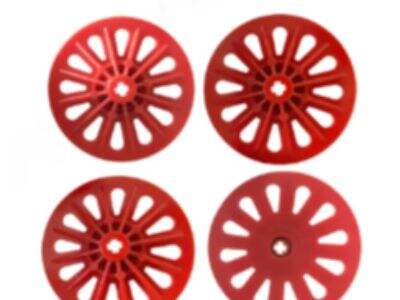Plastic washers are integral components used in many products: cars, household appliances, and even toys. These tiny washers are a major contributor to keeping bigger components, like nuts and bolts, securely in place. The most important feature with regards to plastic from which the washers are made as it has a crucial role in the functionality. Being a manufacturer of numerous types of plastic washers, Yifang gets plenty of questions on what plastic washer would be ideal for some application. In this article, we will discuss types of plastic washers, and help you choose the best one for you.
Plastic washers are manufactured from one of the following types of plastics:
There are countless types of plastic material employed in the production of members. Each type has built-in traits that make it suitable for various applications. Toughness is one of such attributes. The foam board washer must be strong enough to stay tight with the nut and the bolt and to keep all solid. If the insulation board washers is not strong, it will likely break or not hold parts together. Chemical resistance is one of the main characteristics in a certain type of plastic. In other cases, some chemicals touch the plastic washer and lead to its breakdown or wear in the long term. Make sure the temperature is also something to be noted. Some foam board insulation board washers have to operate under warm temperatures, while others are used in cold conditions.
Types of Plastics for Washers
I had no idea that there are so many plastics available to use for washers because they had never been used before in my experience. There are a number of different types of plastic, each with its own set of characteristics that may make it superior to others for specific uses. The four most commonly used types of plastic to make washers are described below:
Nylon: A chemical-resistant, durable plastic.
Nylon washers are ideal where chemicals will react with plastic. But nylon insulation board washers won't work at high temperature, and must not be used if the temperature is too high.
High-Temperature Polycarbonate: Another variety of plastic that's tough and also has a high-temperature rating. Polycarbonate washers are great options for hot projects, but they turn out poorly near chemicals, so they're not a good option for that use.
Which makes choosing the right washer for your solutions a render.
Acetal: Is another resistant resin and can be used under the high temperature condition. Its chemical resistance is good, hence it can handle some of them without degrading. That is all, of course, insulation fixing washer without the fact that it's not suitable to every type of chemical, but you will need to ascertain what types of chemicals it will be exposed to.
 EN
EN
 AR
AR
 BG
BG
 HR
HR
 CS
CS
 DA
DA
 NL
NL
 FI
FI
 FR
FR
 DE
DE
 EL
EL
 HI
HI
 IT
IT
 JA
JA
 KO
KO
 NO
NO
 PL
PL
 PT
PT
 RO
RO
 RU
RU
 ES
ES
 SV
SV
 TL
TL
 IW
IW
 ID
ID
 SR
SR
 UK
UK
 VI
VI
 HU
HU
 TH
TH
 TR
TR
 FA
FA
 MS
MS
 GA
GA
 IS
IS
 LA
LA
 MN
MN
 NE
NE
 KK
KK
 UZ
UZ



